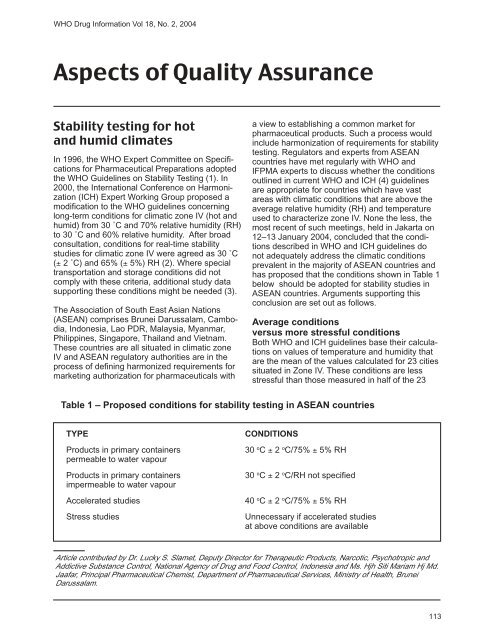WHO Drug Information Vol. 18, No. 2, 2004 - World Health ...
WHO Drug Information Vol. 18, No. 2, 2004 - World Health ...
WHO Drug Information Vol. 18, No. 2, 2004 - World Health ...
You also want an ePaper? Increase the reach of your titles
YUMPU automatically turns print PDFs into web optimized ePapers that Google loves.
<strong>WHO</strong> <strong>Drug</strong> <strong>Information</strong> <strong>Vol</strong> <strong>18</strong>, <strong>No</strong>. 2, <strong>2004</strong><br />
Aspects of Quality Assurance<br />
Stability testing for hot<br />
and humid climates<br />
In 1996, the <strong>WHO</strong> Expert Committee on Specifications<br />
for Pharmaceutical Preparations adopted<br />
the <strong>WHO</strong> Guidelines on Stability Testing (1). In<br />
2000, the International Conference on Harmonization<br />
(ICH) Expert Working Group proposed a<br />
modification to the <strong>WHO</strong> guidelines concerning<br />
long-term conditions for climatic zone IV (hot and<br />
humid) from 30 ˚C and 70% relative humidity (RH)<br />
to 30 ˚C and 60% relative humidity. After broad<br />
consultation, conditions for real-time stability<br />
studies for climatic zone IV were agreed as 30 ˚C<br />
(± 2 ˚C) and 65% ( ± 5%) RH (2). Where special<br />
transportation and storage conditions did not<br />
comply with these criteria, additional study data<br />
supporting these conditions might be needed (3).<br />
The Association of South East Asian Nations<br />
(ASEAN) comprises Brunei Darussalam, Cambodia,<br />
Indonesia, Lao PDR, Malaysia, Myanmar,<br />
Philippines, Singapore, Thailand and Vietnam.<br />
These countries are all situated in climatic zone<br />
IV and ASEAN regulatory authorities are in the<br />
process of defining harmonized requirements for<br />
marketing authorization for pharmaceuticals with<br />
a view to establishing a common market for<br />
pharmaceutical products. Such a process would<br />
include harmonization of requirements for stability<br />
testing. Regulators and experts from ASEAN<br />
countries have met regularly with <strong>WHO</strong> and<br />
IFPMA experts to discuss whether the conditions<br />
outlined in current <strong>WHO</strong> and ICH (4) guidelines<br />
are appropriate for countries which have vast<br />
areas with climatic conditions that are above the<br />
average relative humidity (RH) and temperature<br />
used to characterize zone IV. <strong>No</strong>ne the less, the<br />
most recent of such meetings, held in Jakarta on<br />
12–13 January <strong>2004</strong>, concluded that the conditions<br />
described in <strong>WHO</strong> and ICH guidelines do<br />
not adequately address the climatic conditions<br />
prevalent in the majority of ASEAN countries and<br />
has proposed that the conditions shown in Table 1<br />
below should be adopted for stability studies in<br />
ASEAN countries. Arguments supporting this<br />
conclusion are set out as follows.<br />
Average conditions<br />
versus more stressful conditions<br />
Both <strong>WHO</strong> and ICH guidelines base their calculations<br />
on values of temperature and humidity that<br />
are the mean of the values calculated for 23 cities<br />
situated in Zone IV. These conditions are less<br />
stressful than those measured in half of the 23<br />
Table 1 – Proposed conditions for stability testing in ASEAN countries<br />
TYPE CONDITIONS<br />
Products in primary containers 30 o C ± 2 o C/75% ± 5% RH<br />
permeable to water vapour<br />
Products in primary containers 30 o C ± 2 o C/RH not specified<br />
impermeable to water vapour<br />
Accelerated studies 40 o C ± 2 o C/75% ± 5% RH<br />
Stress studies Unnecessary if accelerated studies<br />
at above conditions are available<br />
Article contributed by Dr. Lucky S. Slamet, Deputy Director for Therapeutic Products, Narcotic, Psychotropic and<br />
Addictive Substance Control, National Agency of <strong>Drug</strong> and Food Control, Indonesia and Ms. Hjh Siti Mariam Hj Md.<br />
Jaafar, Principal Pharmaceutical Chemist, Department of Pharmaceutical Services, Ministry of <strong>Health</strong>, Brunei<br />
Darussalam.<br />
113

















